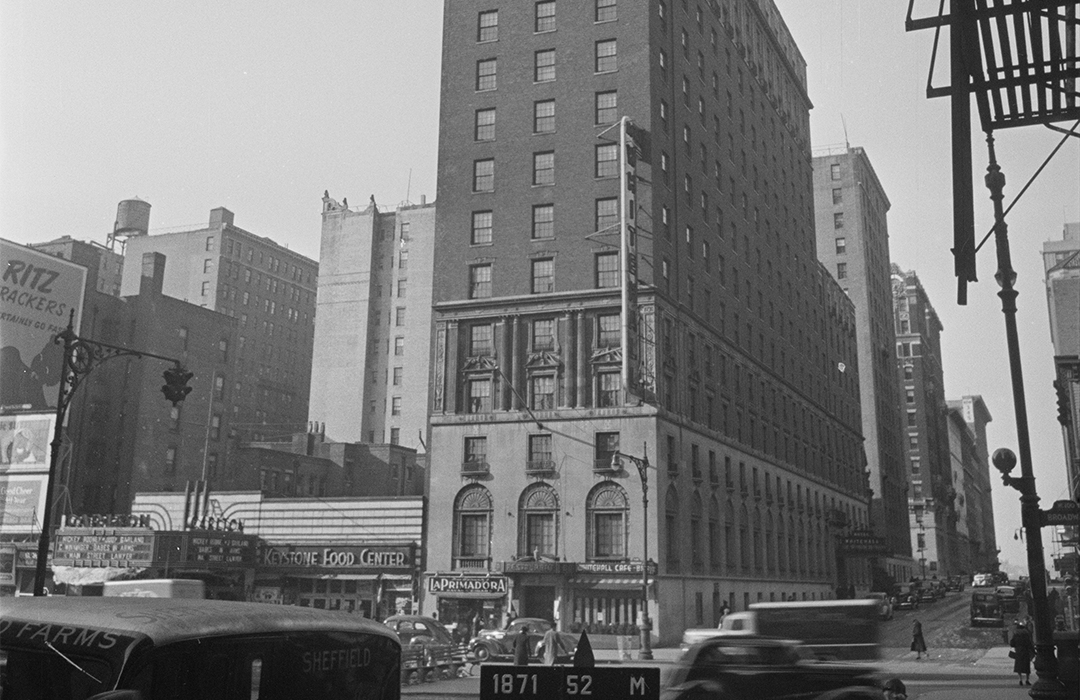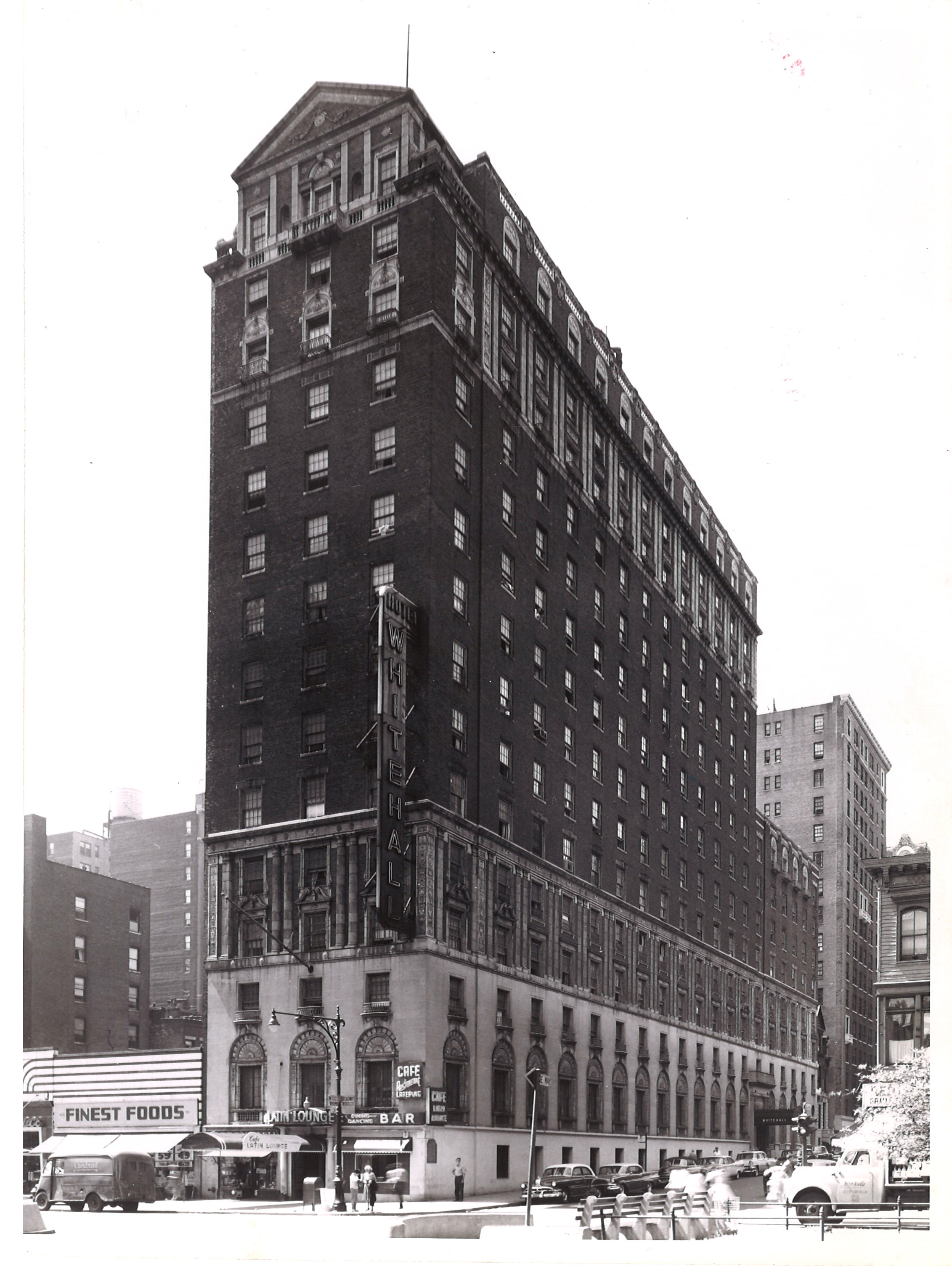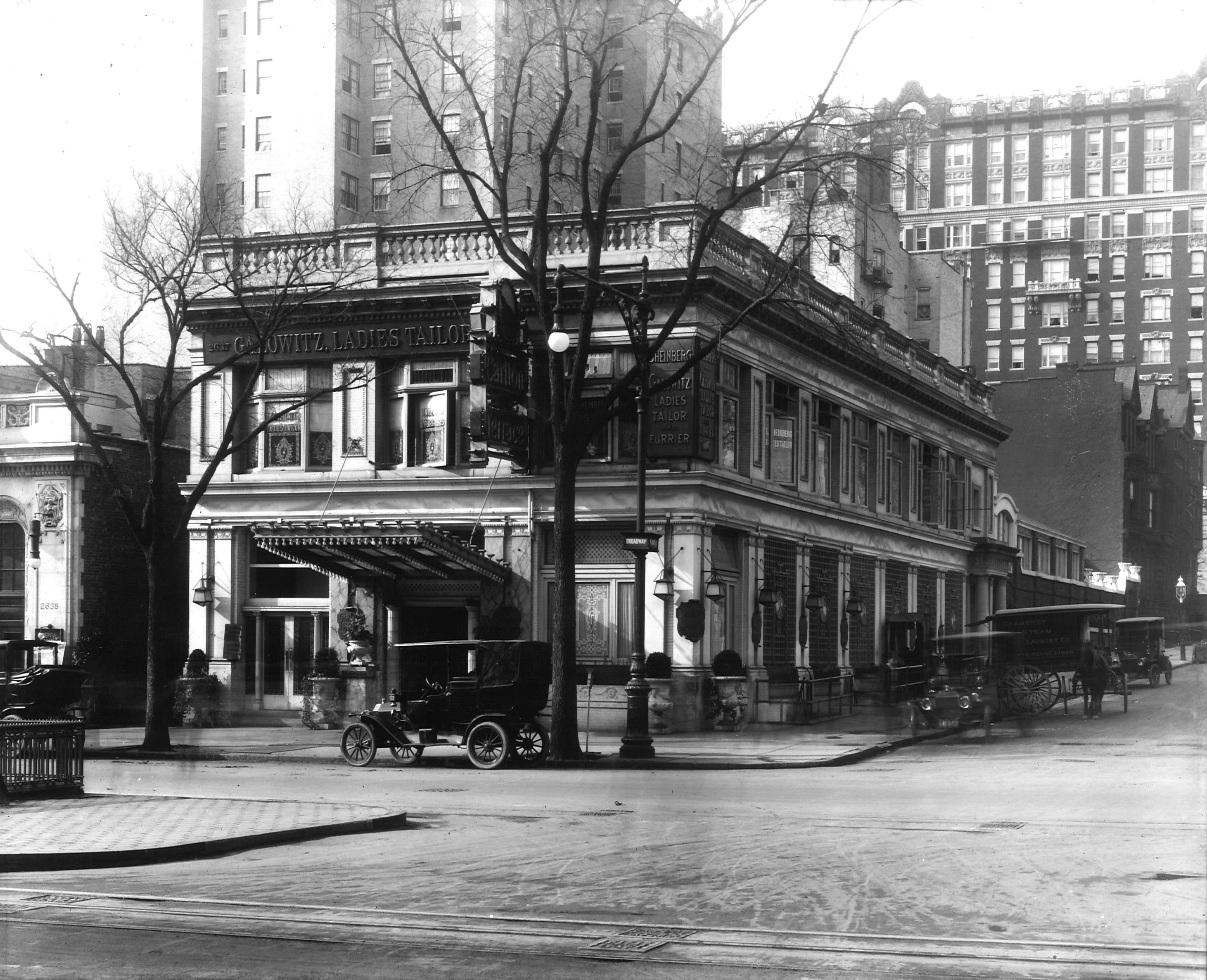
The Whitehall Hotel
by Tom Miller
The Carlton Terrace at the southwest corner of Broadway and 100th Street had been a popular restaurant and nightspot since it opened in October 1911. The enactment of Prohibition led to the financial collapse of numerous restaurants and nightclubs, and shortly after a raid on the Carlton Terrace on August 24, 1922, it closed for good. Real estate developer F. H. McCabe demolished the two-story structure and hired architect Charles B. Meyers to design a 15-story hotel on the site. The Hotel Whitehall opened in 1923, a neo-Renaissance style structure with a three-story stone base. The impressive windows of the second floor sat above stone, balcony-like balustrades, their arched tympani filled with carved fans. The third-floor openings wore Renaissance-inspired swan-neck pediments that embraced stone urns. On the Broadway side, the 15th floor pretended to be an 18th-century Palladian English country house.
The Broadway entrance, which was flanked by a store, seems to have been used by the transient guests. The full-time residents of the Whitehall Hotel entered on the side, at 250 West 100th Street. The store was initially home to Max Selig & Son’s jewelry shop. It had not been in the space long when it became the victim of a notorious gangster. On April 29, 1924, Patrick H. Dealey, described by The Brooklyn Daily Eagle as a “gunman and desperado,” entered with three cohorts. Dealey had escaped from Sing Sing Prison in December 1922 by changing into the costume of an actress whose troupe was giving a performance. Now, he and his band made off with $50,000 in jewelry–more than $790,000 in 2023.
Patrick H. Dealey was ambushed by police outside an apartment house on September 12, 1924. He was tackled before he realized what was happening, and that turned out to be a good thing. He was carrying two guns and 50 rounds of ammunition, and he told police, “I was determined not to be captured. I decided to get as many ‘Dicks’ as I could if they tried to lock me up, and then blow my own brains out. You got me this time, but perhaps I’ll get out again.” Dealy admitted to 60 robberies since his escape, including the Max Selig & Son’s heist.
“I was determined not to be captured. I decided to get as many ‘Dicks’ as I could if they tried to lock me up.”
In the meantime, the long-term suites were leased to well-to-do residents. Among the first was Morris H. Shiman, who came into money in the spring of 1925. His millionaire father, Isaac Shiman died on April 20, leaving a trust fund of $500,000 to Morris and $200,000 to his daughter Jennie. Despite the large amounts, they were a fraction of what the siblings had expected. Their father’s will explained, “Due to the fact that my children have never showed me the affection and respect due a father, I herewith make the following provisions.” The will stipulated that if either should contest the will, the trust funds would be rescinded, and they would each receive just $50,000.
Theodore J. Reisler and his wife were early residents. But it appears their domestic situation soon soured. On November 15, 1926 Reisler posted a public notice in The New York Times that read:
My wife, Erminie Reisler, having left my bed and board, I will not be responsible for any debts contracted by her. Theodore J. Reisler. 250 West 100th Street, New York City.
On February 29, 1928, $19,350 worth of Union Pacific stock certificates disappeared from the brokerage office of Colvin & Co. at 14 Wall Street. A month later, Irving Schoenberger, a partner in the jewelry store of Drouve, Inc. in the Waldorf Hotel, was arrested after he tried to sell them in a broker’s office. Under questioning, he quickly gave up the names of his four accomplices, including Whitehall Hotel resident John Roberts.
Breaking all the gender stereotypes of the period was 19-year-old Celeste Jedel, who lived here in the spring of 1930. An honor student at Barnard College, The New York Sun called her a “typically modern girl.” The article said, “Miss Jedel speaks of the career she wishes to follow in as matter-of-fact a fashion as any boy, mapping out his future, might discuss his hopes and plans.” And Celeste Jedel’s ambitions did not follow the expected professional paths of women. She intended to enter the diplomatic corps. Fluent in French and German, she explained, “The possibility of a woman entering the foreign service has existed only since 1924, when the State Department was reorganized under the Rogers Act…I feel that this profession is not overcrowded and see no reason why a woman may not hope to get to the top.”
Several of the suites were divided during the Depression. An advertisement in The Sun on February 18, 1933, offered furnished apartments of one or two rooms at between $55 and $80 per year—or around $130 a month for the most expensive in 2023 terms. It meant that long-term residents in their large apartments were now living side-by-side with an often-rowdier set. Years later, New York Giants football veteran Jim Lee Howell recalled that when he joined the team in 1937, he lived “with most of the players at the Whitehall Hotel at 100th Street and Broadway and taking the subway to games at Yankee Stadium.” He recalled that a meal in the Whitehall Restaurant cost 30 cents.
Living in the building at the same time as the Giants football team was Carrie B. Ochs, the widow of William B. Ochs and mother of the motion picture pioneer Lee A. Ochs. Her husband, who died in 1926, had been in the clothing business. Lee Ochs owned a chain of 10 movie theaters when he died in June 1935. Carrie B. Ochs died in her apartment on July 26, 1937, at the age of 80.
In 1943, following the repeal of Prohibition, the Broadway commercial space became the Torn Fox Grill. Like most bars, it was sometimes the scene of altercations. On June 20, 1946, a disagreement between Jack Levine and Raymond Mazarredo became physical. In court on July 23, Levine charged Mazaredo of assault. Mazaredo responded by filing the same charges against Levine. The Long Island Star-Journal reported, “According to police, both men landed several sturdy blows during the tussle.” Levine complained that he was “’disabled’ by a kick administered by Mazarredo, and the latter charged that his wounds required medical attention.” Since both men were on parole, the judge simply lengthened their terms.
A renovation completed in 1951 resulted in remodeled suites and a duplex apartment on the top two floors. Within the year, the Broadway Musical Comedy and Operetta Repertory Company opened a theater space in the building. The former Whitehall Restaurant was now Café Europe.
Three men entered the lobby of the Whitehall Hotel early on the morning of December 3, 1956, and held up the clerk, Thomas Sippel. They fled with between $250 and $300, but only one of them escaped. Twenty-five-year-old Michael Sudia was shot dead by a policeman, and 22-year-old Felix Durant was captured three blocks from the hotel. The third robber, who unfortunately had the cash, got away.
Handy was a music publisher, head of the Handy Brothers Music Company, and the founder of Handy’s Band, which recorded for Columbia Records.
Jean Davis lived in a seventh-floor apartment in 1959. On August 30, she opened her door to a young blonde. The 72-year-old widow described her saying she “talked at a rapid pace and was about 28.” Upon entering the apartment, the woman “grabbed a book and hit Mrs. Davis several times,” according to the Long Island Star-Journal. She then tied up the elderly lady and fled with a purse containing $1,400 in cash.
Living here in the late 1960’s until his death on December 9, 1972, was William Christopher Handy and his wife Leonor. Handy was a music publisher, head of the Handy Brothers Music Company, and the founder of Handy’s Band, which recorded for Columbia Records. His father was the famous blues composer and musician W. C. Handy, who referred to himself as the Father of the Blues.
For at least a decade, starting around 1964, Harbin Inn, a Chinese restaurant, occupied the Broadway store space. In the meanwhile, things had changed within the Whitehall Hotel. In 1973 the city began housing welfare recipients here. On October 30, The New York Times reported on the emptying of an S.R.O. facility at the Kimberly Hotel on Broadway at 74th Street. “Most were taken to the Whitehall Hotel at 238 West 100th Street,” said Robert Jorgen, director of the Office of Special Housing Services of the Human Resources Administration. He added, “We’re now considering putting some service program into the Whitehall.”
Somewhat expectedly, some of the new residents found themselves on the wrong side of the law. On September 18, 1974, 23-year-old Carol Clearborn was arrested and charged with breaking into an apartment where her accomplices not only robbed but murdered Johnnie Allison Jr.
Changes came in 1984 when another renovation resulted in “class A” apartments. The Broadway entrance was removed, and two commercial spaces were installed. For over two decades, 2637 Broadway was home to the eastern Mediterranean restaurant, Turkuaz.
Tom Miller is a social historian and blogger at daytoninmanhattan.blogspot.com
BUILDING DATABASE
Keep Exploring
Be a part of history!
Think Local First to support the businesses at 2637-2639 Broadway:
Meet Tsahi Shemesh!




